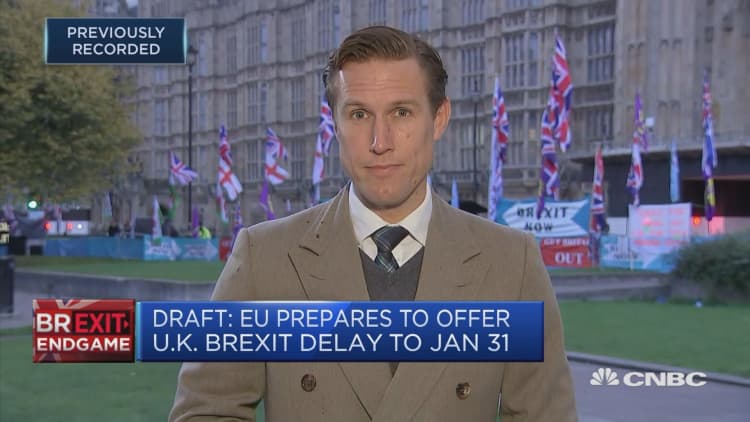U.K. lawmakers are to vote Monday on whether to approve the government's call to have an election on December 12.
Two-thirds of lawmakers (434 out of 650 Members of Parliament) would have to back Prime Minister Boris Johnson's motion to hold an early election.
Johnson's ruling Conservative Party is ahead in voter polls and the prime minister said that if he wins a majority in an election he would ratify the Brexit deal his government reached with Brussels "get Brexit done in January, and the country will move on." It's uncertain whether Johnson will get the votes he needs, however, with opposition parties skeptical about the government's intentions.
While Brexit continues to paralyze the U.K.'s Parliament, the EU decided on Monday to grant the country more time to leave the bloc, until January 31, with the possibility of an earlier exit if Parliament ratifies the divorce deal. The EU said it would not renegotiate the Brexit deal on offer.
Johnson was forced to request an extension after his bid to get a last-minute Brexit deal through Parliament failed. He said MPs could have more time to assess his Brexit deal with the EU if they agreed to his December 12 date.
Election timing 'highly uncertain'
When it comes to an election bid, some opposition parties look set to block the motion, calling instead for an earlier election on their own terms. Many politicians want to see a definite extension to Brexit to January 31 and the risk of a no-deal departure, in which the U.K. leaves the bloc without a deal, removed. They also see an election as another route to getting a second referendum on Brexit too.
Meanwhile, the main opposition Labour party and its leader Jeremy Corbyn have said they will not back an election unless a no-deal Brexit is off the table. An allied party of the government, the Democratic Unionist Party (DUP) in Northern Ireland, said it would consider Johnson's call for an election over the weekend.
If an election on December 12 is approved, the government has said it would try to get its Brexit deal through Parliament before it is dissolved on November 6 ahead of the vote.
Analysts tend to agree that a pre-Christmas election is coming in the U.K., but the timing remains "highly uncertain" as Mujtaba Rahman, managing director of Europe at Eurasia Group, said in a note Friday.
Rahman believes the government will not get the majority it needs to hold an election. "In practice, this means both Conservative MPs (there are 287) and Labour (243) MPs would need to vote for it. Jeremy Corbyn is keeping his options open but will likely order his MPs to abstain on the grounds that Johnson has not guaranteed avoiding a no-deal exit in January or December 2020 (at the end of the transitional period). This will mean Monday's vote will fail," Rahman said.

This will be the third time Johnson fails to force an election in this way, Rahman added, noting that Johnson had tried twice in September, but on neither occasion managed to pass the two-thirds threshold because Labour did not support it.
Sterling was trading flat against the dollar at $1.2822 ahead of Monday's vote, expected in the late afternoon, while London's FTSE 100 index opened slightly lower.
Chief Cross-Asset Strategist at Morgan Stanley, Andrew Sheets, told CNBC Monday that an election was not necessarily detrimental to U.K. assets, however. "Yes, an election is yet one more thing that is happening, it's one more step in the saga that's happening. But … the likely outcomes from an election — if you can remove the no-deal scenario or if you can really lower its odds — I think the market could be fine with a lot of those different outcomes," he told CNBC's "Squawk Box Europe."
The 'nuclear' option?
Eurasia Group's Rahman also noted that there are other ways the government, or opposition, could try to bring about an early election with a vote of no-confidence in the government — either called by the opposition or even by the government itself (a scenario that Rahman described as the "nuclear option.")
A vote of no-confidence would only need a simple majority and if passed, opposition parties would then have an opportunity to create an alternative majority in Parliament with a caretaker prime minister. If none is created or approved, however, an election would take place.
The other option is that a motion of no-confidence is tabled by the government itself.
"There is a nuclear option … the government could in theory put down a motion declaring that it had no confidence in itself. This would be bizarre, and might be a step too far even in exceptional political times. Number 10 aides suggest that Tory (Conservative) MPs could even be ordered to abstain or vote against their own government to ensure a majority. This would put the opposition parties in the unenviable position of not declaring they had no confidence in the government in order to block an election," Rahman said.


